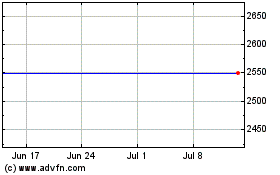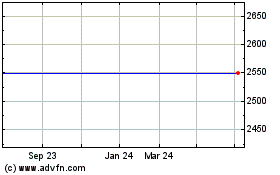UPDATE: Hewlett-Packard Shares At 6-Year Low On Transformation Worries
August 19 2011 - 12:28PM
Dow Jones News
Hewlett-Packard Co. (HPQ) shares fell to their lowest level in
six years as Wall Street's confidence in the Silicon Valley giant
was shaken by management's dramatic restructuring plans and the
company again reducing its financial outlook.
Shares recently tumbled 20% to $23.50, erasing more than $12
billion of the company's market value. H-P's stock hit a low of
$22.75 Friday, its worst point since summer 2005 and 54% lower than
the year high set in February.
Thursday, H-P announced it will get out of computers and mobile
devices--a seemingly sharp reversal from management's previous
comments--and make a big bet on software with a deal seen as pricey
by some. The company also lowered its financial forecast for the
third time this year, citing weak spending by consumers and
governments as well as supply issues in its printing business
resulting from the earthquake in Japan.
The combination of H-P's reduced outlook and the uncertainty
over its pending transformation is causing investors to bail on a
company perceived to be in a multiyear restructuring.
"H-P may have eroded what remained of Wall Street's confidence
in the company and its strategy," said Needham analyst Richard
Kugele, who downgraded the stock to underperform. "We can't help
but get the sense that these dramatic moves are being made from a
position of weakness and not strength, and have an air of
desperation to them."
Auriga analyst Kevin Hunt, in a research note titled "What a
Mess!", admits that H-P is cheap by traditional standards but says
things are likely to get worse before they get better, so "avoid
the value trap."
President and Chief Executive Leo Apotheker, in predicting a
weak fourth quarter, said he understood shareholders would be
upset, but he wanted to be transparent about the problems H-P is
facing and the actions it's taking to resolve them.
"I'm lowering the Q4 guidance to be realistic about where we are
and the challenges we are facing," Apotheker said. "These
challenges and the transformation we are undertaking will take
several quarters to fully resolve. I don't take this action
lightly. I know our investors don't like being in this position,
and neither do I."
For the fourth quarter, H-P said it expects to report per-share
earnings excluding items between $1.12 and $1.16, below the
consensus estimate of $1.31, on revenue of $32.1 billion to $32.5
billion, missing the estimate on Thomson Reuters of $34
billion.
H-P's actions are a step in the right direction, analysts said,
but it won't be easy going. Customers likely will be hesitant to
buy PCs from H-P as it explores the options for the business, and
it will take many quarters, if not years, to restructure and ease
the uncertainty surrounding the company.
"H-P is better served looking for strategic alternatives for the
low-margin PC business and refocusing its efforts on the
enterprise," Morgan Stanley analyst Katy Huberty said. "However,
several concerns will make it difficult for the stock to work in
the near-term."
Huberty said it will be difficult for management to execute
divestitures while integrating a large deal and managing
deteriorating fundamentals in H-P's services business, its imaging
and printing group, and its enterprise servers, storage and
networking group.
To expand its software business, H-P agreed to buy U.K. firm
Autonomy Corp. (AU.LN AUTNY) for $10.25 billion. Autonomy will help
H-P tap into a fast-growing industry that aids customers in
searching loads of data, Needham's Kugele said, but it comes "at a
steep price" and limits the company's balance sheet flexibility to
make future acquisitions.
Auriga's Hunt said the deal's price tag, at roughly 16 times
forward revenue and 64 times price-to-earnings, seems "extreme and
probably says a lot about the growth prospects of H-P's core
software businesses."
"While HP expects the deal to be accretive on an EPS basis, it
is massively dilutive to shareholder value if the true cost of
capital is considered rather than current cash rates," Hunt
said.
H-P also said it was abandoning efforts to sell tablets and
smartphones that challenged Apple Inc.'s (AAPL) iPad and iPhone.
The company had bought Palm last year to gain its webOS operating
system for mobile devices. H-P said its webOS tablet, the TouchPad,
hasn't sold as well as expected, despite a sizeable marketing
campaign. The company plans to license the operating system, rather
than make mobile devices itself.
"This provides yet another example this week of Apple's growing
success driving a major transformation in the tech world,"
Ticonderoga analyst Brian White said.
-By Shara Tibken, Dow Jones Newswires; 212-416-2189;
shara.tibken@dowjones.com
--George Stahl contributed to this article.
Autonomy Corporation (LSE:AU.)
Historical Stock Chart
From Mar 2024 to Apr 2024

Autonomy Corporation (LSE:AU.)
Historical Stock Chart
From Apr 2023 to Apr 2024
